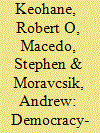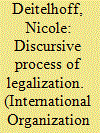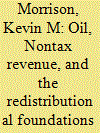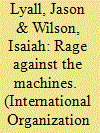|
|
|
Sort Order |
|
|
|
Items / Page
|
|
|
|
|
|
|
| Srl | Item |
| 1 |
ID:
090368


|
|
|
|
|
| Publication |
2009.
|
| Summary/Abstract |
International organizations are widely believed to undermine domestic democracy. Our analysis challenges this conventional wisdom, arguing that multilateral institutions can enhance the quality of national democratic processes, even in well-functioning democracies, in a number of important ways: by restricting the power of special interest factions, protecting individual rights, and improving the quality of democratic deliberation, while also increasing capacities to achieve important public purposes. The article discusses conflicts and complementarities between multilateralism and democracy, outlines a working conception of constitutional democracy, elaborates theoretically the ways in which multilateral institutions can enhance constitutional democracy, and discusses the empirical conditions under which multilateralism is most likely to have net democratic benefits, using contemporary examples to illustrate the analysis. The overall aim is to articulate a set of critical democratic standards appropriate for evaluating and helping to guide the reform of international institutions.
|
|
|
|
|
|
|
|
|
|
|
|
|
|
|
|
| 2 |
ID:
090369


|
|
|
|
|
| Publication |
2009.
|
| Summary/Abstract |
For many political observers the successful creation of the International Criminal Court (ICC) came as a surprise, as major powers, in particular the United States, had opposed the plans for the ICC. Moreover, the institutional design of the ICC entails enormous sovereignty costs for states but only uncertain benefits. An analysis of the negotiations suggests that the court's successful creation can be attributed to persuasion and discourse within negotiations, that is, a shift in states' interests. The article develops a theoretical model of institutional change that defines the conditions under which persuasion and discourse can affect collective decision making. In particular, this study attempts to show that if (traditionally) weaker actors alter normative and institutional settings of negotiations they can further the chance of persuasion and discourse.
|
|
|
|
|
|
|
|
|
|
|
|
|
|
|
|
| 3 |
ID:
090371


|
|
|
|
|
| Publication |
2009.
|
| Summary/Abstract |
Nontax revenues make up a substantial amount of government revenue around the world, though scholars usually focus on individual sources of such revenue (for example, foreign aid and state-owned oil companies). Using a theory of regime change that builds on recent models of the redistributional foundations of dictatorships and democracies, I generate hypotheses regarding all nontax revenue and regime stability. I argue that an increase in nontax revenue should be associated with less taxation of elites in democracies, more social spending in dictatorships, and more stability for both regime types. I find support for all three of these hypotheses in a cross-sectional time-series analysis, covering all countries and years for which the necessary data are available. Significantly, I show that the particular source of nontax revenue does not make a difference: they all act similarly with regard to regime stability and the causal mechanisms.
|
|
|
|
|
|
|
|
|
|
|
|
|
|
|
|
| 4 |
ID:
090370


|
|
|
|
|
| Publication |
2009.
|
| Summary/Abstract |
During the nineteenth century, states routinely defeated insurgent foes. Over the twentieth century, however, this pattern reversed itself, with states increasingly less likely to defeat insurgents or avoid meeting at least some of their demands. What accounts for this pattern of outcomes in counterinsurgency (COIN) wars? We argue that increasing mechanization within state militaries after World War I is primarily responsible for this shift. Unlike their nineteenth-century predecessors, modern militaries possess force structures that inhibit information collection among local populations. This not only complicates the process of sifting insurgents from noncombatants but increases the difficulty of selectively applying rewards and punishment among the fence-sitting population. Modern militaries may therefore inadvertently fuel, rather than deter, insurgencies. We test this argument with a new data set of 286 insurgencies (1800-2005) and a paired comparison of two U.S. Army divisions in Iraq (2003-2004). We find that higher levels of mechanization, along with external support for insurgents and the counterinsurgent's status as an occupier, are associated with an increased probability of state defeat. By contrast, we find only partial support for conventional power- and regime-based explanations, and no support for the view that rough terrain favors insurgent success.
|
|
|
|
|
|
|
|
|
|
|
|
|
|
|
|
| 5 |
ID:
090373


|
|
|
|
|
| Publication |
2009.
|
| Summary/Abstract |
International institutions within the past thirty years become the subject of renewed interest as scholars vigorously dispute their utility. Neorealists draw on the post-World War II era to advance sweeping general claims of institutional inefficacy. This study, by contrast, deploys the same hard-test method Grieco applied to the 1970s Tokyo Round negotiations to the crisis-rife 1870s to construct a unique methodological objective: a rigorous hard-test of nineteenth-century institutional autonomy. Three principal findings emerged. First, the maintenance of a liberal world economy in the turbulent 1870s is explained by an unlikely commercial instrument and the unprecedented regime design of an unexplored international institution-respectively the unconditional most-favored-nation (MFN) clause and the informal conventional tariff system (CTS) regime it underpinned-not British hegemony. Second, the international trade regime was not a public good unilaterally provisioned by "hegemonic" Britain via the 1846 Corn Laws Repeal. The regime was instead a private good that was collectively provisioned by all its constituent member states via the unprecedented interstate practices institutionalized in the 1860 Cobden-Chevalier Treaty and then autonomously maintained by a negarchical and self-enforcing sanctioning mechanism. Finally, the informal CTS regime's enforcement mechanism autonomously altered the interests and behaviors of states in directions incongruent with executive preferences solely through the brute force of rational calculations imposed by decentralized international institutional constraints. Both the French and British executives in the 1870s believed the regime was normatively inappropriate and unsuccessfully attempted to exit amid eight system-threatening crises. Nonetheless, the MFN-based regime's self-enforcing sanctioning mechanism autonomously induced compliance: conceptualized as unitary states' behavior deviating from executives' first-order preference. The extraordinarily turbulent 1870s therefore provide an unexplored historical vantage point to make strong institutionalist claims in an era, issue area, and under conditions that they are least likely to be validated.
|
|
|
|
|
|
|
|
|
|
|
|
|
|
|
|
|
|
|
|
|